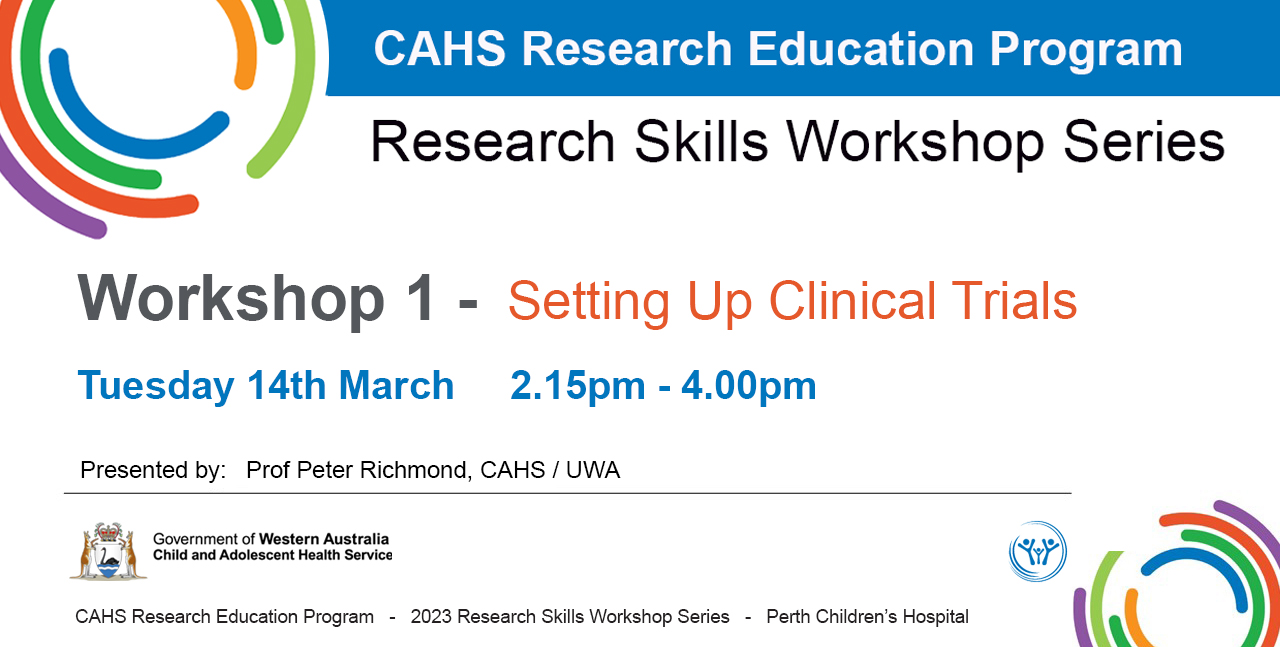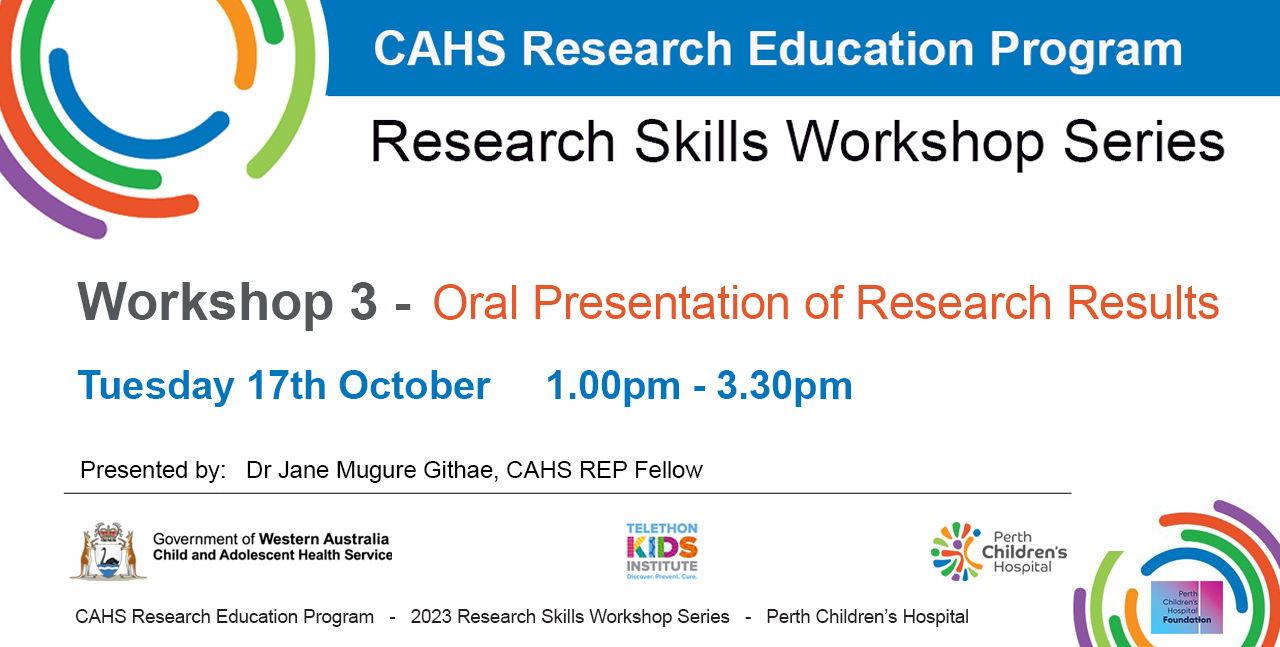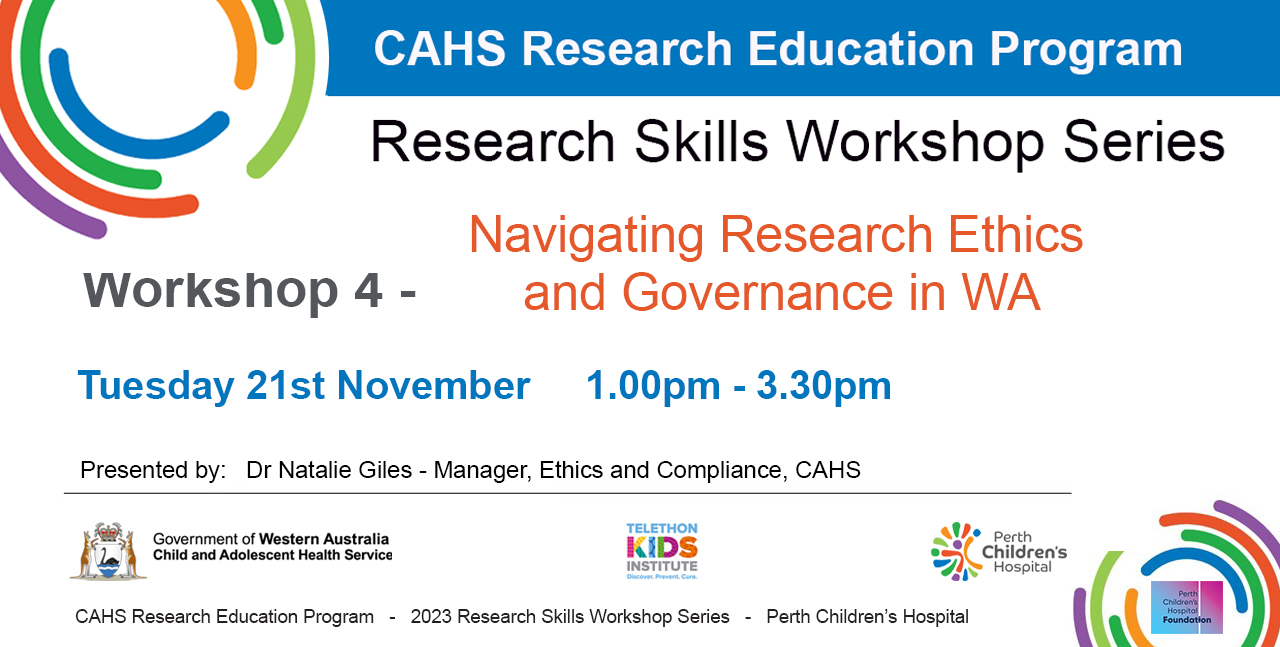Additional resources
The below content is referenced throughout numerous Research Education Program seminar recordings and handouts. Each item can also be independently viewed as a useful tool or information source for researchers and students.
Duration 8:58
Duration 22:35
Duration 28:37
Duration 9:12
The Australian Code for the Responsible Conduct of Research, 2018 (the 2018 Code) establishes a framework for responsible research conduct that provides a foundation for high-quality research, credibility and community trust in the research endeavour.
Read more here National Health and Medical Research Council (NMHRC).
Acceptable GCP training is TransCelerate accredited.
CAHS Department of Research recommends the following three free options:
- Global Health Trials (approximately 45 to 60 minutes)
- Research Education & Training Program (RETP) - WA Health Translation Network (WAHTN) (approximately 5 hours)
- WACHS has funded a WA membership for the Australian Clinical Trials Education Centre (A-CTEC) to enable all WA HSP researchers to access online training. Download the info flyer.
Watch our CAHS REP seminar and workshop recordings:
- Introduction to Good Clinical Practice seminar, presented by Alexandra Robertson, Director of Research Operations CAHS - 22 March 2024
- Research Governance seminar, presented by Dr Natalie Giles, Manager Research Ethics and Governance, CAHS - 19 April 2024
- Navigating Research Ethics and Governance in WA Workshop, presented by Medya Ahmadian and Sam Crawford, CAHS Research Governance Coordinators - 1 May 2024
- Setting Up Clinical Trials Workshop,presented by Dr Charlie McLeod, The Kids Research Institute Australia - 20 May 2024
Register for our upcoming seminars (in-person and online):
- Ethics Processes for Clinical Research in WA, presented by Dr Natalie Giles, Manager Research Ethics and Governance, CAHS - 15 November 2024, 12.30 - 1.30pm
GEKO is the database used to register information relating to all quality improvement activities within CAHS. CAHS HealthPoint (WA Health only) contains lots of useful information such as answers to frequently asked questions, PCH GEKO registration information and downloadable fact sheets for both investigators and committee members.
For more about GEKO, contact the Administrators listed on the GEKO page or email SQP.CAHS@health.wa.gov.au.
The National Statement on Ethical Conduct in Human Research (updated 2023) consists of a series of guidelines made in accordance with the National Health and Medical Research Council Act 1992.
This statement is referenced in our seminar, "Introduction to Good Clinical Practice" by Alexandra Robertson, Directore of Research Operations CAHS. Access the most recent recording of this seminar: here.
Publication Details
National Statement on Ethical Conduct in Human Research (2023)
Canberra: Commonwealth of Australia.
Reference number
E72C
ISBN
TEPHINET has created a free resource for those keen on learning "R".
Created by epidemiologists for epidemiologists, this open-source manual serves as a great introduction to R programming for field epidemiologists responding to public health emergencies. The handbook includes sample R code and tutorials addressing a wide range of data management and visualisation tasks with epidemiological examples, and is available in an offline version for use in settings with low internet connectivity.
The Research Education Program (REP) has expanded the Research Skills Workshops in 2025 to include additional topics. The interactive group sessions work through the finer details of: preparing and submitting grant proposals, tips and hints for presenting your research and the intricacies around ethics and governance processes for clinical research in WA.
2025 Workshop Schedule
These workshops are presented in-person only. Places are capped at 40.
| Workshop Topic | Day | Date | Time | Venue | Presenter/s | Registration link |
| Workshop 1 Navigating Research Ethics and Governance in WA |
Tuesday | 1 April 2025 | 1.00pm - 3.00pm |
The Kids Seminar Room PCH Level 5 (west) |
Ethics and Governance Team, CAHS |
the 2024 recording |
| Workshop 2 Grants |
Tuesday | 8 April 2025 | 1.00pm - 3.00pm |
The Kids Seminar Room PCH Level 5 (west) |
Dr Erika Sutanto, CAHS | |
|
Workshop 3 |
Tuesday | 20 May 2025 | 10.00am - 12.00pm |
The Kids Seminar Room PCH Level 5 (west) |
Dr Charlie McLeod The Kids Institute |
Watch |
|
Workshop 4 |
Tuesday | 20 May 2025 | 1.00pm - 3.00pm |
The Kids Seminar Room PCH Level 5 (west) |
Hayley Harrison, Coordinator Consumer Engagement, CAHS Aine Sommerfield, Research Coordinator Amber Bates, consumer representative |
|
|
Workshop 5 |
Thursday | 22 May 2025 | 1.00 - 3.00pm | The Kids Seminar Room PCH Level 5 (west) |
Melanie Wright, Director of Research, SMHS |
Watch |
| Workshop 6 Manuscript Writing |
Tuesday | 3 June 2025 | 2.00 - 4.00pm |
The Kids Seminar Room PCH Level 5 (west) |
Dr Kenneth Lee, University of Western Australia |
Watch |
| Workshop 7 Biostatistics |
Tuesday | 29 July 2025 | 1.00 - 3.00pm | The Kids Seminar Room PCH Level 5 (west) |
Michael Dymock, The Kids Institute / Angela Jacques, CAHS | |
|
Workshop 8 |
Tuesday | 9 September 2025 | 1.00 - 3.00pm |
The Kids Seminar Room PCH Level 5 (west) |
Kerryn McKinnon, The Kids Institute | |
| Workshop 9 Oral Presentation of Research Results |
Tuesday | 22 October 2025 | 1.00 - 3.00pm | The Kids Seminar Room PCH Level 5 (west) |
Dr Hannah Benschop, CAHS Research Fellow 2025 | |
| Workshop 10 Supervision (panel discussion) |
Tuesday | 25 November 2025 | 1.00 - 3.00pm | The Kids Seminar Room PCH Level 5 (west) |
||
| Workshop 11 Introduction to Good Clinical Practice |
TBA in late 2025 | The Kids Seminar Room PCH Level 5 (west) |
Simone Knab, CAHS |
Previous Recorded Workshops
|
Watch the recording
|
WORKSHOP 1 RECORDING - Setting up Clinical Trials Presented by: Prof Peter Richmond, UWA/CAHS Clinical trials are the benchmark for testing interventions in healthcare. This workshop aims to provide practical advice to clinical researchers who want to gain insight on how to develop and complete their clinical trial on time and within budget. Learn practical aspects of the steps involved in developing a clinical trial from the research idea to protocol development and execution.
|

Watch the recording |
WORKSHOP 2 RECORDING: Manuscript Writing Presented by: Dr Kenneth Lee, UWA Journal publications are an integral part of dissemination of research findings. However, it can be overwhelming to convert several months of research into a succinct manuscript that will be loved by peer-reviewers and attract readers. This workshop is designed to give those who have completed their research projects, practical skills to transform their research data into publishable peer-reviewed literature. |
|
Watch the recording |
WORKSHOP 3 RECORDING: Oral Presentation of Research Results Dissemination of research findings is integral in knowledge translation and clinical practice change. Oral presentations provide rapid dissemination of research findings to a target audience. We invite you to a practical session that will provide useful tips, practice sessions and personalised feedback to help deliver an adequate depth of your research findings to various research stakeholders. |
|
Watch the recording |
WORKSHOP 4 RECORDING: Navigating Research Ethics and Governance in WA Presented by: Dr Natalie Giles, Manager - Research Ethics and Governance, CAHS If you are undertaking a research project or are thinking about becoming involved in research, understanding the review and approval requirements for your research project may appear intimidating. This workshop aims to help you understand the process of ethical and governance review for research approvals at CAHS - includes PCH, CACHS, CAHMS and Neonatology. |
There are many free, open-access educational resources available to support and guide clinical researchers.
- Australian Clinical Trials Education Centre (A-CTEC) - access professional development for WA researchers
- CAHS Medical Library
- Child and Adolescent Community Health
- East Metropolitan Health Service - Royal Perth Hospital
- Harry Perkins Institute of Medical Research
- North Metropolitan Health Service - Sir Charles Gardiner Hospital
- South Metropolitan Health Service - Fiona Stanley Hospital
- St John of God Health Care - Education and Training
- The West Australian Health Translational Network - Research and Education Training Program (RET Program)
If you know of any additional useful websites please let us know.




